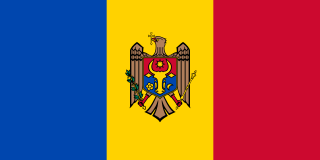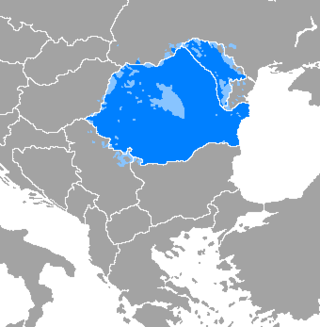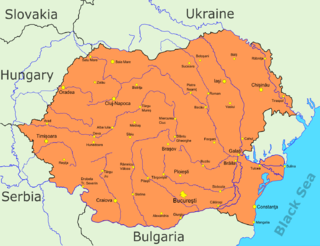
Moldova, officially the Republic of Moldova, is a landlocked country in Eastern Europe, on the northeastern corner of the Balkans. The country spans a total of 33,483 km2 (12,928 sq mi) and has a population of approximately 2.42 million as of January 2024. Moldova is bordered by Romania to the west and Ukraine to the north, east, and south. The unrecognised breakaway state of Transnistria lies across the Dniester river on the country's eastern border with Ukraine. Moldova is a unitary parliamentary representative democratic republic with its capital in Chișinău, the country's largest city and main cultural and commercial centre.

Romanian is the official and main language of Romania and Moldova. Romanian is part of the Eastern Romance sub-branch of Romance languages, a linguistic group that evolved from several dialects of Vulgar Latin which separated from the Western Romance languages in the course of the period from the 5th to the 8th centuries. To distinguish it within the Eastern Romance languages, in comparative linguistics it is called Daco-Romanian as opposed to its closest relatives, Aromanian, Megleno-Romanian, and Istro-Romanian. It is also spoken as a minority language by stable communities in the countries surrounding Romania, and by the large Romanian diaspora. In total, it is spoken by 25 million people as a first language.

The Commonwealth of Independent States (CIS) is a regional intergovernmental organization in Eurasia. It was formed following the dissolution of the Soviet Union in 1991. It covers an area of 20,368,759 km2 (7,864,422 sq mi) and has an estimated population of 246,200,194. The CIS encourages cooperation in economic, political, and military affairs and has certain powers relating to the coordination of trade, finance, lawmaking, and security, including cross-border crime prevention.

Chișinău is the capital and largest city of Moldova. The city is Moldova's main industrial and commercial centre, and is located in the middle of the country, on the river Bîc, a tributary of the Dniester. According to the results of the 2014 census, the city proper had a population of 532,513, while the population of the Municipality of Chișinău was 700,000. Chișinău is the most economically prosperous locality in Moldova and its largest transportation hub. Nearly a third of Moldova's population lives in the metro area.
Moldovan or Moldavian is one of the two local names for the Romanian language in Moldova. Moldovan was declared the official language of Moldova in Article 13 of the constitution adopted in 1994, while the 1991 Declaration of Independence of Moldova used the name Romanian. In 2003, the Moldovan parliament adopted a law defining Moldovan and Romanian as glottonyms for the same language. In 2013, the Constitutional Court of Moldova interpreted that Article 13 of the constitution is superseded by the Declaration of Independence, thus giving official status to the name Romanian. The breakaway region of Transnistria continues to recognize "Moldavian" as one of its official languages, alongside Russian and Ukrainian. Ukraine also continued until recently to make a distinction between Moldovan and Romanian, with one village declaring its language to be Romanian and another declaring it to be Moldovan, though Ukrainian officials have announced an intention to remove the legal status of Moldovan. On 16 November 2023, the Ministry of Education and Science of the Ukrainian government stated that it has initiated steps to abolish the Moldovan language and to replace it with Romanian. On 13 January 2024, Ukrainian newspaper Dumska reported that the Ukrainian Ministry of Education and Science had announced all 16 schools in Odesa Oblast teaching "Moldovan" had dropped the term in favor of Romanian. On 16 March 2023, the Moldovan Parliament approved a law on referring to the national language as Romanian in all legislative texts and the constitution. On 22 March, the president of Moldova, Maia Sandu, promulgated the law.

Air Moldova was the flag carrier airline for The Republic of Moldova, headquartered in the country's capital Chișinău. It mainly operated scheduled and charter services to destinations within Europe from its base at Chișinău International Airport. Air Moldova suspended all operations on 3 May 2023.

Transnistria, officially known as the Pridnestrovian Moldavian Republic and locally as Pridnestrovie, is a landlocked breakaway state internationally recognized as part of Moldova. It controls most of the narrow strip of land between the Dniester river and the Moldova–Ukraine border, as well as some land on the other side of the river's bank. Its capital and largest city is Tiraspol. Transnistria is officially designated by the Republic of Moldova as the Administrative-Territorial Units of the Left Bank of the Dniester or as Stînga Nistrului.

The politics of Transnistria, an unrecognised de facto state situated de jure within the Republic of Moldova in Eastern Europe, take place in a framework of a semi-presidential republic, whereby the president is head of state and the prime minister is head of government. Executive power is exercised by the government. Legislative power is vested in both the government and parliament. Officially, Transnistria has a multi-party system and a unicameral parliament, called the Supreme Council. The president is elected by popular vote. The latest parliamentary elections were held in November 2020.

Moldova elects a legislature at national level. The Parliament (Parlamentul) has 101 members, elected for a four-year term by proportional representation with a 6% electoral threshold. The President used to be elected for a four-year term by a constitutional majority of 60% members of the Parliament, but a Constitutional Court's ruling on 4 March 2016, reverted the election method of the President to a two-round system direct election.

Moldova has participated in the Eurovision Song Contest 19 times, debuting in 2005. The Moldovan participant broadcaster in the contest is Teleradio-Moldova (TRM). The country's best result is a third-place finish with "Hey Mamma" by SunStroke Project in 2017.

The Transnistria War was an armed conflict that broke out on 2 November 1990 in Dubăsari between pro-Transnistria forces, including the Transnistrian Republican Guard, militia and neo-Cossack units, which were supported by elements of the Russian 14th Army, and pro-Moldovan forces, including Moldovan troops and police.

Moldovans, sometimes referred to as Moldavians, are the ethnic group native to the Moldova, who mostly speak the Romanian language, locally referred also as Moldovan. 75.1% of the Moldovan population declared Moldovan ethnicity in the 2014 Moldovan census, and Moldovans form significant communities in Romania, Italy, Ukraine and Russia.

The unification of Moldova and Romania is the idea that Moldova and Romania should become a single sovereign state and the political movement which seeks to bring it about. Beginning during the Revolutions of 1989, the movement's basis is in the cultural similarity of the two countries, both being Romanian-speaking, and their history of unity as part of Greater Romania.

Moldovenism is a term used to describe the political support and promotion of a Moldovan identity and culture, including a Moldovan language, independent from those of any other ethnic group, the Romanians in particular. It is primarily used as a pejorative by the opponents of such ideas as part of the wider controversy over ethnic and linguistic identity in Moldova.

This is the history of Transnistria, officially the Pridnestrovian Moldavian Republic (PMR), an unrecognised breakaway state that is internationally recognised as part of Moldova. Transnistria controls most of the narrow strip of land between the Dniester river and the Moldovan–Ukrainian border, as well as some land on the other side of the river's bank.

Fotbal Club Zimbru Chișinău, commonly known as Zimbru Chișinău or simply Zimbru, is a Moldovan professional football club based in Chișinău, which competes in the Super Liga, the highest tier of Moldovan football.

Fotbal Club Bălți, commonly known as Bălți, is a Moldovan professional football club based in Bălți, founded in 1984 as FC Zaria Bălți and refounded in 2020 as FC Bălți. They play in the Super Liga, the top division of Moldovan football. Between 1992 and 2014, the team was known as FC Olimpia Bălți.

The vast majority of the Moldovan people are Orthodox Christians, but there is a small community of Muslims in Moldova, numbering a few thousand.

Denmark – Moldova relations refers to the current and historical relations between Denmark and Moldova. Neither country has a resident ambassador. The Moldovan Ambassador to Denmark is Igor Corman, who resides in Berlin and was appointed in 2005. The Danish Ambassador in Moldova is Ole Harald Lisborg, who resides in Bucharest. Denmark is a member of the European Union, which Moldova applied for in 2022. Both countries are full members of Council of Europe.
Moldova participated in the Eurovision Song Contest 2011 with the song "So Lucky" written by Roman Iagupov, Mihai Gîncu, Andy Shuman and Marc Elsner. The song was performed by the band Zdob şi Zdub. The Moldovan broadcaster TeleRadio-Moldova (TRM) organised the national final O melodie pentru Europa 2011 in order to select the Moldovan entry for the 2011 contest in Düsseldorf, Germany. 98 entries competed to represent Moldova in Düsseldorf, with 25 being shortlisted to participate in the televised national final which took place on 26 February 2011 after auditioning in front of a jury panel. "So Lucky" performed by Zdob şi Zdub emerged as the winner after gaining the most points following the combination of votes from a jury panel and a public televote.

















